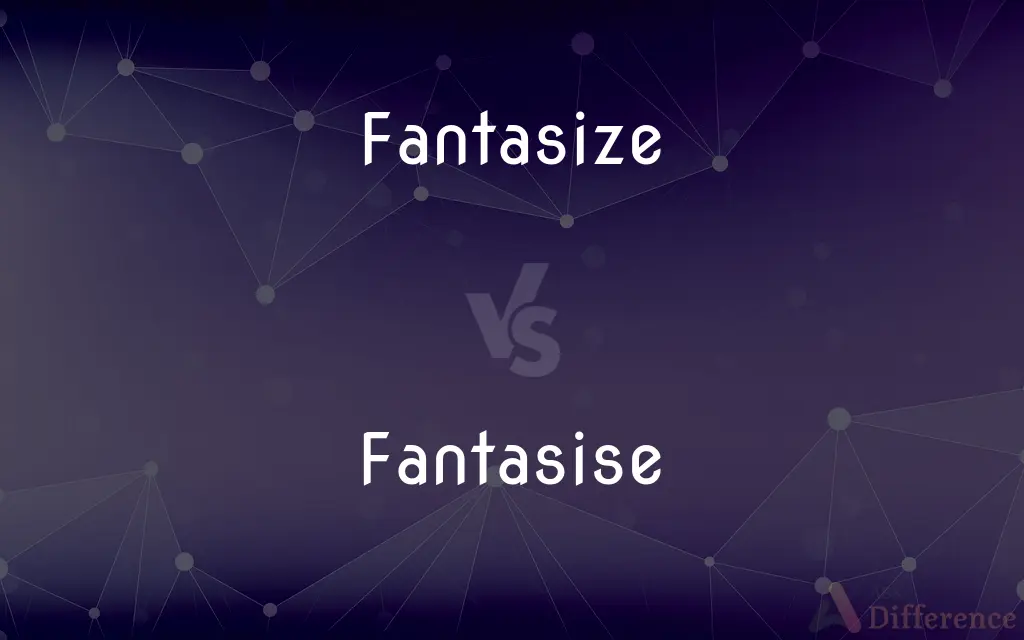Fantasize vs. Fantasise — What's the Difference?
By Urooj Arif & Maham Liaqat — Updated on April 9, 2024
"Fantasize" is the American English spelling, while "fantasise" follows British English conventions.

Difference Between Fantasize and Fantasise
Table of Contents
ADVERTISEMENT
Key Differences
The term "fantasize" adheres to American English spelling rules, which often simplify words by using "ize" endings. In contrast, "fantasise" is the preferred spelling in British English, which typically uses "ise" endings for verbs.
While "fantasize" reflects the American tendency towards phonetic simplicity and efficiency in language, "fantasise" aligns with British English's adherence to form and tradition. Both variations, however, carry the same meaning and usage in context.
In the realm of digital communication and global media, "fantasize" is widely recognized and often used internationally, reflecting American English's influence. On the other hand, "fantasise" remains prevalent in British publications and materials, emphasizing regional linguistic identity.
The choice between "fantasize" and "fantasise" can also signal the writer's cultural or geographical identity, with "fantasize" being more common in American settings, whereas "fantasise" is typically seen in British, Australian, and other Commonwealth countries' writings.
Despite their spelling differences, both "fantasize" and "fantasise" refer to the act of imagining something desirable, especially as a form of mental escape. The distinction does not affect the word's meaning, application, or the nature of the fantasies involved.
ADVERTISEMENT
Comparison Chart
Spelling
American English spelling with "ize."
British English spelling with "ise."
Pronunciation
Generally the same in both American and British English.
Generally the same in both American and British English.
Usage Region
Predominantly used in the United States.
Commonly used in the United Kingdom and other Commonwealth countries.
Digital Presence
Often used in international and American digital content.
More common in British and Commonwealth digital content.
Linguistic Identity
Reflects American English linguistic preferences.
Indicates British English or Commonwealth linguistic preferences.
Compare with Definitions
Fantasize
The act of daydreaming or envisioning scenarios that are removed from reality.
She likes to fantasize about living in a different era.
Fantasise
To engage in imaginative thought, particularly of scenarios that are desirable or pleasing.
He would often fantasise about exploring ancient ruins.
Fantasize
To create unrealistic expectations or desires.
He tends to fantasize about ideal outcomes that are unlikely to happen.
Fantasise
To create mental images or scenarios that are impractical or unattainable.
She tends to fantasise about a life of luxury and ease.
Fantasize
To envision or dream about possible scenarios or aspirations.
Entrepreneurs often fantasize about their future success.
Fantasise
The act of dreaming or thinking about situations that are beyond the scope of reality.
After reading fairy tales, the children would fantasise about adventures in magical lands.
Fantasize
To indulge in imaginative thoughts that are purely speculative.
As a child, I would fantasize about having superpowers.
Fantasise
The process of thinking about desires or goals in a way that is not grounded in reality.
Aspiring athletes may fantasise about winning gold medals.
Fantasize
To imagine or create fanciful or whimsical scenarios in one's mind.
I often fantasize about traveling to space.
Fantasise
To imagine oneself in scenarios that are purely fictional or highly unlikely.
They often fantasise about meeting their favorite celebrities.
Fantasize
To portray in the mind; imagine.
Fantasise
(intransitive) To indulge in fantasy; to imagine things only possible in fantasy.
He's so hot. I used to fantasise about him constantly.
Fantasize
To have fantasies.
Fantasise
(transitive) To portray in the mind, using fantasy.
Fantasize
(intransitive) To indulge in fantasy; to imagine things only possible in fantasy.
I fantasized about my ideal date.
Fantasise
Indulge in fantasies;
He is fantasizing when he says he plans to start his own company
Fantasize
(transitive) To portray in the mind, using fantasy.
Fantasise
Portray in the mind;
He is fantasizing the ideal wife
Fantasize
Indulge in fantasies;
He is fantasizing when he says he plans to start his own company
Fantasize
Portray in the mind;
He is fantasizing the ideal wife
Common Curiosities
Is there a difference in meaning between fantasize and fantasise?
No, there is no difference in meaning. The variation is purely orthographic, reflecting American vs. British spelling conventions.
How should non-native English speakers decide whether to use fantasize or fantasise?
Non-native speakers should consider the primary version of English they are learning or the version most commonly used in their region or by their audience.
Why does American English prefer "ize" while British English prefers "ise"?
The "ize" ending in American English aligns with the Greek root of many words, while British English's "ise" reflects French influence and older English usage.
Are there any exceptions to when fantasize and fantasise can be used?
There are no exceptions; the choice between the two depends solely on regional spelling conventions.
How do digital platforms handle the difference between fantasize and fantasise?
Digital platforms typically cater to a global audience and may use either form, though American English is often more prevalent online.
Do English language exams distinguish between American and British spellings like fantasize and fantasise?
Most English language exams accept both American and British spellings, but it's important to remain consistent throughout your writing.
Are there other words that follow the same spelling variation pattern as fantasize and fantasise?
Yes, many verbs that end in "-ize" in American English end in "-ise" in British English, such as organize/organise and realize/realise.
Is there a trend towards standardizing the spelling to either fantasize or fantasise globally?
While there is some movement towards standardization in certain contexts, regional preferences remain strong.
Can both spellings be used interchangeably?
While they can be understood interchangeably, usage typically aligns with the regional spelling preferences of the audience.
Has the prevalence of one spelling over the other changed over time?
Globalization and the influence of American media have made "fantasize" more universally recognized, though "fantasise" remains steadfast in British and Commonwealth regions.
In academic writing, should I prefer fantasize or fantasise?
The preference depends on the style guide being followed, which often aligns with the regional norms of the institution or publication.
Do dictionaries list both variations of fantasize and fantasise?
Yes, most comprehensive English dictionaries list both variations, noting the regional usage.
Can the usage of fantasize or fantasise impact the perception of a writer's professionalism?
In contexts where regional English norms are valued, adherence to those norms can reflect positively on the writer's attention to detail and cultural awareness.
How do publishers decide which spelling to use in international publications?
Publishers often choose the spelling based on the intended primary audience or adopt a style guide that specifies the preferred English variant.
How do educators in English-as-a-second-language (ESL) settings approach the difference between fantasize and fantasise?
ESL educators typically teach the spelling conventions of the version of English they are specializing in, though they may also highlight differences where relevant.
Share Your Discovery

Previous Comparison
Disinvite vs. Uninvite
Next Comparison
Adductor vs. AbductorAuthor Spotlight
Written by
Urooj ArifUrooj is a skilled content writer at Ask Difference, known for her exceptional ability to simplify complex topics into engaging and informative content. With a passion for research and a flair for clear, concise writing, she consistently delivers articles that resonate with our diverse audience.
Co-written by
Maham Liaqat












































